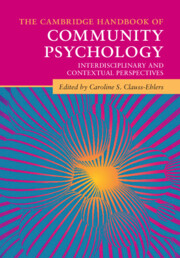Book contents
- The Cambridge Handbook of Community Psychology
- The Cambridge Handbook of Community Psychology
- Copyright page
- Dedication
- Contents
- Figures
- Tables
- Contributors
- Foreword
- Part I Foundational Concepts
- Part II Research, Assessment, and Program Evaluation
- 6 Conducting Culturally Responsive Community Needs Assessments
- 7 Comprehensive Evaluation of a Rural School Mental Health Program
- 8 Constructive Diversity Pedagogy for Challenging Classroom Dialogues
- 9 Critical Language Ethnography as a Community-Centered Research Paradigm
- Part III Community Psychology in Action
- Part IV Where Do We Go from Here?
- Index
- References
8 - Constructive Diversity Pedagogy for Challenging Classroom Dialogues
Participatory Action Research with Interdisciplinary Faculty
from Part II - Research, Assessment, and Program Evaluation
Published online by Cambridge University Press: 16 December 2021
- The Cambridge Handbook of Community Psychology
- The Cambridge Handbook of Community Psychology
- Copyright page
- Dedication
- Contents
- Figures
- Tables
- Contributors
- Foreword
- Part I Foundational Concepts
- Part II Research, Assessment, and Program Evaluation
- 6 Conducting Culturally Responsive Community Needs Assessments
- 7 Comprehensive Evaluation of a Rural School Mental Health Program
- 8 Constructive Diversity Pedagogy for Challenging Classroom Dialogues
- 9 Critical Language Ethnography as a Community-Centered Research Paradigm
- Part III Community Psychology in Action
- Part IV Where Do We Go from Here?
- Index
- References
Summary
Relevant to the values of community psychology, we described the foundation for a professional development, participatory action research project with an interdisciplinary and diverse group of new faculty. The Constructive Diversity Pedagogy Participatory Action Research (CDP PAR) project was originated as one response, in the context of our university community and broader sociopolitical current events, to expand educating for social justice. This collaborative seed project was conducted by and for the CDP PAR faculty team of participants. In an intensive, small-group, semester-long professional development program, the team focused on examining and promoting together our own (a) social justice critical consciousness and (b) skills to facilitate challenging diversity dialogues in our classrooms that advance social justice critical consciousness, include multiple voices, consider alternative perspectives, and expand learning.
Keywords
- Type
- Chapter
- Information
- The Cambridge Handbook of Community PsychologyInterdisciplinary and Contextual Perspectives, pp. 161 - 174Publisher: Cambridge University PressPrint publication year: 2021

